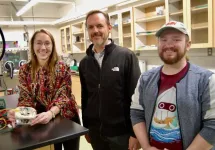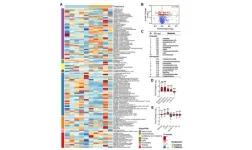(Press-News.org) PHILADELPHIA (April 9, 2024) – The bitter taste of certain drugs is a barrier to taking some medications as prescribed, especially for people who are particularly sensitive to bitter taste. Published in Clinical Therapeutics, a team from the Monell Chemical Senses Center found that the diabetes drug rosiglitazone could partially block the bitter taste of some especially bad-tasting medications. Rosiglitazone could be added in small doses to other medicines, to make them less bitter and taste better.
This result provided new information. “To our knowledge, there are no previous reports on the bitter-blocking effect of this diabetes drug,” said first author Ha Nguyen, PhD, Monell Postdoctoral Fellow. Rosiglitizone was identified as a potential bitter blocker using tests of human cells from taste tissue, a method of screening developed by Monell and DiscoveryBiomed, Inc., now Eurofins.
The team conducted taste-testing experiments on research participants in the United States and Poland, and they found that adding rosiglitazone to the medicines reduced bitterness for many, but not all, research participants.
“People differ, and we need to test many types of people from different parts of the world to make sure that efforts to reduce bitterness and make medicines easier to take work well for all people,” said senior author Danielle Reed, PhD, Monell Chief Science Officer.
These results suggest having more blockers to choose from will help entirely suppress the bitterness of many types of medicines for a wide range of populations and ancestries. Mixtures of several blockers may help attain a low-to-zero-bitterness standard for even the most bitter-tasting medicines.
“Although rosiglitazone was only partially effective as a bitter blocker in this study, modifying these drugs to improve potency, palatability, and efficacy may allow us to find a better version of this drug,” said Nguyen. “Rosiglitazone is valuable as a bitter blocker because it is potentially effective in most people and is part of a class of drugs already approved worldwide for treating diabetes.”
Next steps in this line of research include a similar study that measures bitter blocking in several hundred African and Asian immigrants to add to the diversity of participants’ ancestries with regard to bitter taste.
In addition to Nguyen and Reed, coauthors are Cailu Lin, PhD, Ivona Sasimovich, Katherine Bell, Amy Huang, Nancy E. Rawson, PhD, all from Monell, and Emilia Leszkowicz, PhD, from the University of Gdańsk.
This work was supported by the National Institutes of Health (R42 DC017693), the Monell Chemical Senses Center’s Carol M. Christensen Postdoctoral Fellowship in Human Chemosensory Science Fund, and Monell Chemical Senses Center Institutional Funds.
###
The Monell Chemical Senses Center is an independent nonprofit research institute in Philadelphia, Pennsylvania. Monell was founded in 1968, and its mission is to improve health and well-being by advancing the scientific understanding of taste, smell, and related senses, where our discoveries lead to improving nutritional health, diagnosing and treating disease, addressing smell and taste loss, and digitizing chemosensory data.
END
Beating back bitter taste in medicine
Monell Center scientists discover that diabetes drug is partially effective as a bitter blocker
2024-04-09
ELSE PRESS RELEASES FROM THIS DATE:
Heart regeneration pioneer to join UW–Madison, Morgridge Institute
2024-04-09
04/09/2024
CONTACT: Deneen Wellik, wellik@wisc.edu
Heart regeneration pioneer to join UW–Madison, Morgridge Institute
MADISON — A biologist who explores the potential life-saving mechanisms of how organisms regenerate damaged heart and spinal cord tissue will join the University of Wisconsin–Madison and the Morgridge Institute for Research this fall.
Kenneth Poss, presently the James B. Duke Professor of Regenerative Biology at Duke University, explores a research area that has grown ...
Can the bias in algorithms help us see our own?
2024-04-09
Algorithms were supposed to make our lives easier and fairer: help us find the best job applicants, help judges impartially assess the risks of bail and bond decisions, and ensure that healthcare is delivered to the patients with the greatest need. By now, though, we know that algorithms can be just as biased as the human decision-makers they inform and replace.
What if that weren’t a bad thing?
New research by Carey Morewedge, a Boston University Questrom School of Business professor of marketing and Everett W. Lord Distinguished Faculty Scholar, found that people recognize more of their biases in algorithms’ decisions ...
This device gathers, stores electricity in remote settings
2024-04-09
Today wirelessly connected devices are performing an expanding array of applications, such as monitoring the condition of engines and machinery and remote sensing in agricultural settings. Systems known as the “Internet of Things” (IoT), hold much potential for improving the efficiency and safety of the equipment.
Yet stumbling blocks remain for IoT, thwarting many potential applications. How do you power these devices in situations where and when reliable electrical sources are not practically available?
Research from the University of Utah’s College of Engineering points to a possible solution in the form of a novel type of battery called ...
AACR: Video educates and connects men to prostate cancer screening options
2024-04-09
SAN DIEGO – As part of a comprehensive effort to improve cancer screenings among diverse communities, Penn Medicine’s Abramson Cancer Center (ACC) Community Outreach and Engagement team developed a culturally sensitive educational video to address prostate cancer screening disparities. In findings shared today at the American Association for Cancer Research (AACR) Annual Meeting 2024 (Abstract LB371), the team showed that the video increased knowledge about prostate cancer and screening, and reduced uncertainty about obtaining prostate ...
Culturally sensitive video targeting Black men may help increase awareness about prostate cancer
2024-04-09
SAN DIEGO – A video designed to educate Black men about prostate cancer resulted in 97% of surveyed participants acknowledging that Black men are at a higher risk of this disease and 93% saying they would get screened, according to a study presented at the American Association for Cancer Research (AACR) Annual Meeting 2024, held April 5-10.
Black men have the highest incidence of prostate cancer in the United States with 184.2 new cases per 100,000 people compared to white men with 111.5 new cases per 100,000 people, according to the National Cancer Institute’s Surveillance, ...
St. Jude survivorship portal brings researchers ‘one-click’ away from discovery
2024-04-09
(MEMPHIS, Tenn. – April 9, 2024) Scientists from St. Jude Children’s Research Hospital today announced the St. Jude survivorship portal — the first data portal for sharing, analyzing and visualizing pediatric cancer survivorship data. Details on the portal and its ability to facilitate breakthroughs in pediatric cancer survivorship research were published today in Cancer Discovery, a journal of the American Association for Cancer Research.
The survivorship portal is a big-data platform that incorporates clinical and genomic information, creating an unprecedented research system. The portal integrates three dimensions ...
System uses artificial intelligence to detect wild animals on roads and avoid accidents
2024-04-09
Just as in Brazil drivers can be warned of traffic congestion ahead or a vehicle parked on the hard shoulder, notifications may soon pop up on their smartphone or on their car’s computer screen to warn them in real time that an anteater, wolf or tapir is crossing the highway. No human will necessarily need to see the animal in question or press a control button to send the warning.
For this to be possible, a key step is construction of a computer vision model that automatically detects Brazilian wild animals. Researchers ...
Has remote work changed how people travel in the U.S?
2024-04-09
The prevalence of remote work since the start of the Covid-19 pandemic has significantly changed urban transportation patterns in the U.S., according to new study led by MIT researchers.
The research finds significant variation between the effects of remote work on vehicle miles driven and on mass-transit ridership across the U.S.
“A 1 percent decrease in onsite workers leads to a roughly 1 percent reduction in [automobile] vehicle miles driven, but a 2.3 percent reduction in mass transit ridership,” says Yunhan Zheng SM ’21, PhD ’24, an MIT postdoc who is co-author of the study.
“This is one of the first studies that identifies the causal effect ...
UC Irvine scientist helps link climate change to Madagascar’s megadrought
2024-04-09
Irvine, Calif., April 9, 2024 — A University of California, Irvine-led team reveals a clear link between human-driven climate change and the years-long drought currently gripping southern Madagascar. Their study appears in the Nature journal Climate and Atmospheric Science.
“Using remotely sensed observations and climate models, we could see evidence that climate change is affecting the hydrological cycle in southern Madagascar, and it’s likely going to have big implications for the people that live there and how they grow their food,” ...
CMS121 mitigates aging-related obesity and metabolic dysfunction
2024-04-09
“[...] CMS121 applicability could be expanded from a geroneuroprotector drug to a metabolic drug [...]”
BUFFALO, NY- April 9, 2024 – A new research paper was published in Aging (listed by MEDLINE/PubMed as "Aging (Albany NY)" and "Aging-US" by Web of Science) Volume 16, Issue 6, entitled, “CMS121: a novel approach to mitigate aging-related obesity and metabolic dysfunction.”
Modulated by differences in genetic and environmental factors, laboratory mice often show progressive weight gain, eventually leading to obesity and metabolic dyshomeostasis. ...
LAST 30 PRESS RELEASES:
A biological material that becomes stronger when wet could replace plastics
Glacial feast: Seals caught closer to glaciers had fuller stomachs
Get the picture? High-tech, low-cost lens focuses on global consumer markets
Antimicrobial resistance in foodborne bacteria remains a public health concern in Europe
Safer batteries for storing energy at massive scale
How can you rescue a “kidnapped” robot? A new AI system helps the robot regain its sense of location in dynamic, ever-changing environments
Brainwaves of mothers and children synchronize when playing together – even in an acquired language
A holiday to better recovery
Cal Poly’s fifth Climate Solutions Now conference to take place Feb. 23-27
Mask-wearing during COVID-19 linked to reduced air pollution–triggered heart attack risk in Japan
Achieving cross-coupling reactions of fatty amide reduction radicals via iridium-photorelay catalysis and other strategies
Shorter may be sweeter: Study finds 15-second health ads can curb junk food cravings
Family relationships identified in Stone Age graves on Gotland
Effectiveness of exercise to ease osteoarthritis symptoms likely minimal and transient
Cost of copper must rise double to meet basic copper needs
A gel for wounds that won’t heal
Iron, carbon, and the art of toxic cleanup
Organic soil amendments work together to help sandy soils hold water longer, study finds
Hidden carbon in mangrove soils may play a larger role in climate regulation than previously thought
Weight-loss wonder pills prompt scrutiny of key ingredient
Nonprofit leader Diane Dodge to receive 2026 Penn Nursing Renfield Foundation Award for Global Women’s Health
Maternal smoking during pregnancy may be linked to higher blood pressure in children, NIH study finds
New Lund model aims to shorten the path to life-saving cell and gene therapies
Researchers create ultra-stretchable, liquid-repellent materials via laser ablation
Combining AI with OCT shows potential for detecting lipid-rich plaques in coronary arteries
SeaCast revolutionizes Mediterranean Sea forecasting with AI-powered speed and accuracy
JMIR Publications’ JMIR Bioinformatics and Biotechnology invites submissions on Bridging Data, AI, and Innovation to Transform Health
Honey bees navigate more precisely than previously thought
Air pollution may directly contribute to Alzheimer’s disease
Study finds early imaging after pediatric UTIs may do more harm than good
[Press-News.org] Beating back bitter taste in medicineMonell Center scientists discover that diabetes drug is partially effective as a bitter blocker







